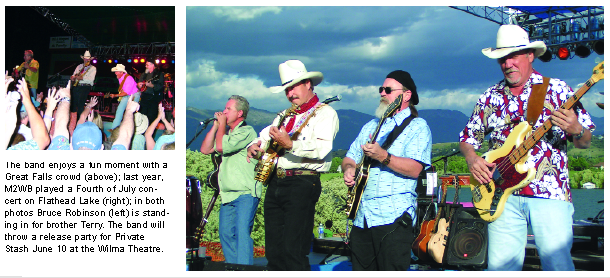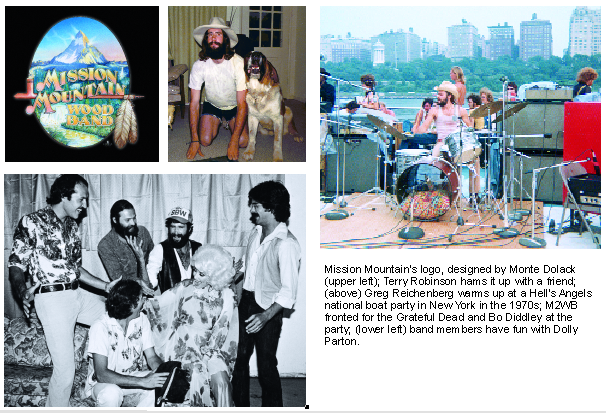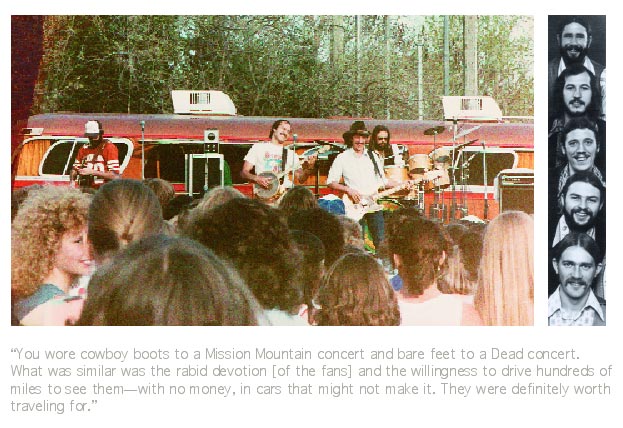IN WITHOUT KNOCKING
by Simone Ellis The Mission Mountain Wood Band is a Montana legend. No one can live in the state long without hearing stories of this explosive home-grown band that created Woodstock-style happenings in Missoula, then traveled America’s highways for ten years delivering a unique blend of rock and roll, country, bluegrass, and just plain down-home mountain music to college campuses, television studios, and the smoky clubs of New York City—always returning home to play for throngs of fevered fans at UM’s annual Aber Day parties.
The Mission Mountain Wood Band is a Montana legend. No one can live in the state long without hearing stories of this explosive home-grown band that created Woodstock-style happenings in Missoula, then traveled America’s highways for ten years delivering a unique blend of rock and roll, country, bluegrass, and just plain down-home mountain music to college campuses, television studios, and the smoky clubs of New York City—always returning home to play for throngs of fevered fans at UM’s annual Aber Day parties.
The University of Montana is the proud parent of this legend. The five original members—Rob Quist, Steve Riddle, Christian Johnson, Greg Reichenberg, and the late Terry Robinson—were all UM
students and Montana natives. Quist is from Cutbank, Riddle from Libby, Robinson from Kalispell, and Reichenberg and Johnson from Billings.
They each played at least two instruments, collectively mastering every wooden instrument light enough to carry. They played banjos, acoustic and electric guitars and bass, mandolins, fiddle, steel guitar, flute, and every kind of drum worth hitting. Four-part harmonies were their trademark—along with theatrical shows that included jig dancing, country patter, and lots of stomping. They wrote their own songs and rearranged ones that would never be the same after their version emerged.
During their ’70s heyday the band played more than 250 shows a year, performing in every state in the union except Hawaii. But what they were most known for were the audiences that showed up every time, everywhere they played. In the spirit of what makes Montana home to every walk of life and credo, Mission Mountain Wood Band’s following was as diverse as its music. Bikers, hippies, bankers, punks, and politicians were known to drive far out of their way to catch a Mission Mountain concert.
According to anyone who was lucky enough to be around at the time, Mission Mountain was a one-of-a-kind band. No knockoffs, no look-alikes. The closest thing to a Mission Mountain concert would have been a concert by the Grateful Dead—a comparison that is often made. But it is a comparison of apples and oranges, according to UM MFA graduate Dyna Kuehnle, a former girlfriend of Robinson’s and still a close friend to the band members and their families.

“The whole shit-kicker aspect of Mission Mountain wasn’t something you’d apply to the Dead,” Kuehnle says—having been schooled in both. “You wore cowboy boots to a Mission Mountain concert and bare feet to a Dead concert. What was similar was the rabid devotion [of the fans] and the willingness to drive hundreds of miles to see them—with no money, in cars that might not make it. They were definitely worth traveling for. You never sat down during a Mission Mountain concert. There was a lot of stomping. I mean, stomping. By the end of every concert you’d inevitably have a mixture of mud and beer up to your knees.”
Mission Mountain Wood Band—or M2WB as it came to be known—formed in 1971. The nation was in the midst of deeply troubled and turbulent times. The Vietnam War was raging and the draft was still in effect. Out of this a phenomena emerged what would become a Montana diplomatic core that bucked the political rhetoric of the times, delivering a unique brand of music and humor to a nation that got its idea of the West from old movies.
“Our members came from many different backgrounds and we never really had a political point of view,” says Rob Quist in an interview from his ranch in Creston, Montana. “In fact our only political slogan was, ‘Return the outland to the outlandish!’”
Founders Quist and Riddle met in UM’s music department. They had both made it past rigorous auditions to get into the Jubileers, an elite, mixed-gender vocal group still going strong today. The Jubileers travel across the country and to Europe promoting UM’s music department.
It was there, under the tutelage of Joseph Mussulman, that their soon-to-be famous stage presence and flawless harmonies began to take shape. In the Jubileers, a young Quist learned to refine complex, classically based, harmonic vocalizations that he’d been interested in since childhood. Coupled with Riddle’s rock and roll arrangements, a new sound emerged that never lost the original edge that began in the Jubileers.
“He (Mussulman) was our captain,” Riddle says from his home in Missoula. “He had a large influence on us, by kicking us in the butt and saying, ‘What you’re doing is good. Here is what you need to fix.’ So it wasn’t just a group of kids in a garage somewhere. We’d go out and play, and we’d go to school and our professors at the University music school would talk to us about what was working and what wasn’t. That was our beginning.”
When one listens to their music in Private Stash, recently re-released in a box set of five CDs, one can hear the influence of the Jubileers. Bits of show tunes, square dance refrains, barbershop quartets, and classic standards sung in sweet harmonies are sprinkled like spice through complex arrangements of original country, rock and roll, and bluegrass songs. (The Private Stash collection also includes a film documentary, which will premiere June 10 at the Wilma Theatre in Missoula, followed by a release party performance by the band.)
One of the most surprising cuts in the collection is a four-part harmony, a capella version of “The Star Spangled Banner,” which several members of Mission Mountain still sing every year at UM’s Homecoming game.
Quist remembers the chance meeting with Riddle that was the origin of the band. “I was sitting on my front porch playing my guitar and all of a sudden Steve went rolling by in his Triumph,” Quist says. “He had a stocking cap on with his hair blowing out about two feet behind him.” Having known him in the Jubileers, Quist waved Riddle down. “Mission Mountain got its start right there on Livingston Avenue in Missoula,” muses Quist. “Just makes you think about the things that happen by chance.”
They promptly agreed to recruit Terry Robinson, who, “sang like a bird.” They knew Robinson from campus—he’d attended the business school at UM before taking a job for the railroad. “Terry was working as a gandy-dancer,” Quist says, “and he said he didn’t want to give up his job. But after one gig, he quit his job at the railroad and never looked back.”
Riddle takes great relish in telling the story of M2WB’s first gig when they were still an acoustic three-piece band. “We were playing the fundraiser circuit for a guy running for the U.S. Congress, a young guy, you might have heard of him ... his name was Max Baucus.” He laughs and adds that M2WB has always taken the credit for getting Senator Baucus into Congress. Baucus would probably agree. Years later, M2WB were playing in Washington DC, and as the story goes, Baucus interrupted the Senate’s procedures with great gravity to introduce five guys in jeans, hats, neck scarves, long hair and mustaches, sitting in the balcony. “Ladies and gentlemen of the Senate, I’d like to introduce you to our guests, Montana’s favorite sons, the Mission Mountain Wood Band.”

Sharing the bill at that first Baucus gig was a rock and roll band named Sperry Grade, featuring Christian Johnson on lead guitar and Greg Reichenberg on drums. Both were good rock musicians, and they were good looking, a requirement for M2WB membership. (The M2WB’s party-line motivation for forming a band in the first place was to attract women, which, according to all accounts, they accomplished. Incidentally, they attracted keepers. All of the surviving members are still married to women they met during the heyday of M2WB.)
After a little negotiating, Johnson and Reichenberg signed up and Mission Mountain Wood Band hit the stage at full throttle. Within months, giant, quirky audiences began to show up everywhere their name went on a marquee, and the party was on. UM’s Aber Day keggers would attract as many as 13,000 people who drank a thousand kegs of beer (all in support of UM’s Mansfield Library) and listened to headliner acts, including Bonnie Raitt, Jimmy Buffett, Jefferson Airplane, and the Nitty Gritty Dirt Band. But every year it was M2WB that brought the crowd to their feet, flocking to the stage en masse to dance to their homeboys, playing under the Montana spring sun.
In 1973 Kissinger came on national television and announced that the draft was over. Free from the dark cloud of the Vietnam War draft, the boys bought a scenic cruiser Greyhound bus and hit the road for New York. There they met up with Riddle’s older brother, Dick, who hooked them up with top-notch management. The older Riddle took up where Mussulman had left off, tutoring them after every show to become tighter and more professional, until they could confidently play any venue. From college stadiums to the country and western set of Hee Haw on national television to the crammed punked-out clubs of the Lower East Side in New York City, including the notorious club on the Bowery, CBGB’s, M2WB delivered show after show to packed audiences.
Mission Mountain refreshed their shows as they went, using their double-decker bus as rehearsal space and bedrooms, growing into a musical phenomenon that could not be pigeonholed, and their audiences grew with them.
During their years in New York—1973 to 1976—they began scripting their shows and played nearly every night, intermittently going back out on the road through the auspices of a fledgling National Association of Campus Activities (NACA). They put together what Riddle calls “planned spontaneity,” rehearsing shows over and over until the material was airtight.
Quist and Riddle had learned in the Jubileers to keep the show rolling no matter what happened, and the band became adept at achieving unstoppable performances. One time Robinson stepped into a hole on stage and fell through. Quist remembers turning around and seeing Terry’s head sticking out of the stage. He was still singing and playing his instrument. Robinson’s six-foot-seven stature served him well—his bearded head was just barely sticking up through the stage floor, but the band finished the number without missing a beat.
In 1977 M2WB released In Without Knocking. It featured a cover depicting cowboys riding crazed horses through the door of a western saloon. Taken from a painting of the same name by Montana’s own Charlie Russell, the phrase was a metaphor for the way this wild party band from Montana crashed the tightly controlled, record-company- dictated music world of the ’70s. It sold like hotcakes, and their tune “Take a Whiff on Me” was an underground anthem at parties across the country for years.
After a decade of being “road dogs,” as Quist’s wife Bonni calls them, the boys were finally beginning to settle down. One by one they married their sweethearts from the early days. Bonni Willows, who was a UM business student and cheerleader, married Quist. Mary Ann McKenzie, also a business student at UM, married Riddle. Johnson and Reichenberg married women they’d met on the road, Catherine Quilici and Ann Schumacher respectively. This left Robinson the only single guy in the group. The couples started having kids and it got more difficult for the once fancy-free and notoriously flirtatious men to stay away from their wives and kids for long periods of time.
Sometimes they’d take the kids with them. When Guthrie Quist was just a toddler, Rob took him on the road for the first time. They were in Park City, Utah, when he set up the little guy in a dressing room just off stage and instructed him to leave the backdrop curtain open just enough so that Dad could keep an eye on him while he was playing.

“Guthrie was always a night-owl like his dad and midway through the show one night,” Bonni Quist remembers, “Rob turns around and Guthrie had gotten up, gotten dressed. He had his little jeans and boots on. He must not have been more than two and a half, but he came out on stage with his guitar. He didn’t know how to play his guitar, but he knew how to gyrate, and he started gyrating. People started cracking up and he totally stole the show.”
Like their fathers, many of the band’s kids are headed for show business careers. Guthrie Quist received a full scholarship to study voice at Pepperdine University, and his sister, Halladay, went to Vienna recently with UM’s Jubileers. “They even sing some of the same songs that we sang,” says Quist.
Two of Steve and Mary Ann Riddle’s three kids, Sam and Libby, graduated in 2005 from the UM School of Journalism. Sam played basketball for the Grizzlies and Libby was a UM cheerleader. After graduating, Sam took a job at the Grand Hilton Hotel on the Strip in Las Vegas. “He plays a big white Steinway piano six nights a week, in a tuxedo,” Steve Riddle tells us. “I was brought up with piano lessons as a kid. In my house [growing up] you had to take piano or get an apartment. Consequently, I took piano for eight or nine years.”
Libby is headed for a career in broadcast journalism. Dixie Riddle is a Hellgate High School drama star. The Johnson’s daughter, Gina, majored in dance at the prestigious Loyola-Marymount College in Los Angeles and is a founding member of a ballet company, Meh-tropolis. The Reichenberg’s son, Matthew, a songwriter and lead guitarist, is about to graduate from Georgia State. His sister, Cate, is studying medicine at the University of Georgia.
It was a sad day for all concerned when the Mission Mountain Wood Band split up in 1982. The draw of home and family had pulled them apart. Lead singer Terry Robinson decided to stay on the road and formed the Montana Band. Kurt Bergeron, who had played with M2WB, joined Robinson, and Quist also played with the band for a few years. Then in 1987, Robinson and the entire Montana Band died in a fiery plane crash over Peaceful Bay on the west shore of Flathead Lake. It was July Fourth. They had just played an outdoor gig and were heading to another show in Athol, Idaho, when they decided to buzz the crowd. The plane, which was probably overloaded, could not pull out of the buzz, and they went down. No one survived the crash. Years later, many fans remember that crash and think of it as the end to the M2WB legend. Recently Quist describes that day as “the end of innocence.”
Though all the surviving members still play music—Rob Quist plays full time and organizes the occasional M2WB reunion (with Bruce Robinson stepping in for his brother Terry)—the economic realities of raising families have moved them to find second careers. Riddle is a radiation therapist in Missoula, Johnson is a sound engineer and teaches private music lessons in Kalispell, and Reichenberg has established three schools in Atlanta, Georgia, for building inspectors. Recently, various members have gotten together for gigs, but a performance with all surviving members is still rare.
When one listens to the band’s haunting version of “Ghost Riders in the Sky,” one can’t help but think that just maybe the spirits of Robinson and Bergeron and M2WB’s beloved road manager, Tom Sawan, who also died in the crash, will show up this summer at the band’s release party to do some stomping for the good ole days. One thing’s for certain, the Yippie Yi Ai, Yippie Yi Yo! of the Mission Mountain Wood Band will keep barreling down the pike of our collective memory for years to come.
 Simone Ellis is a poet, filmmaker, and journalist. She writes about the arts for the Missoulian, is on the board at MCAT, and made a film of the Dalai Lama’s address in Sun Valley in 2005 titled Hands for Compassion. She’s published several poetry books and a book on painting, Santa Fe Art.
Simone Ellis is a poet, filmmaker, and journalist. She writes about the arts for the Missoulian, is on the board at MCAT, and made a film of the Dalai Lama’s address in Sun Valley in 2005 titled Hands for Compassion. She’s published several poetry books and a book on painting, Santa Fe Art.